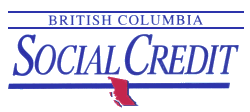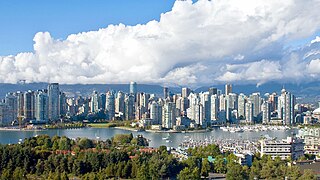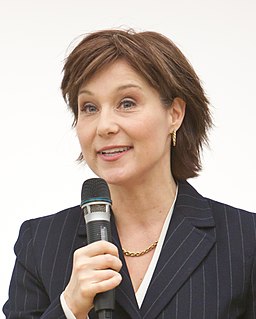
British Columbia (BC) is the westernmost province in Canada, between the Pacific Ocean and the Rocky Mountains. With an estimated population of 5.1 million as of 2020, it is Canada's third-most populous province. The capital of British Columbia is Victoria, the fifteenth-largest metropolitan region in Canada, named for Queen Victoria, who ruled during the creation of the original colonies. The largest city is Vancouver, the third-largest metropolitan area in Canada, the largest in Western Canada, and the second-largest in the Pacific Northwest. In October 2013, British Columbia had an estimated population of 4,606,371. The province is currently governed by the British Columbia New Democratic Party, led by John Horgan with a majority government.
The British Columbia Liberal Party is a centre-right provincial political party in British Columbia, Canada. The party currently forms the Official Opposition. The leader of the Liberal Party, and Leader of the Official Opposition of British Columbia, is Andrew Wilkinson. Subsequent to the 2020 British Columbia general election, Wilkinson announced his resignation as party leader on October 26, 2020 but remained as interim leader until Shirley Bond was chosen as the new interim leader on November 23; the party will begin the process of organizing a leadership convention.
The New Democratic Party of British Columbia is a social-democratic provincial political party in British Columbia, Canada, which currently governs the province. It is the British Columbia provincial arm of the federal New Democratic Party (NDP). The party previously governed from 1972 to 1975 and from 1991 to 2001. Following a hung parliament as a result of the 2017 election and the BC Liberal government's failure to win a confidence vote in the Legislature, the BC NDP secured a confidence and supply agreement with the BC Green Party to form a minority government. The party subsequently won a majority government after Premier John Horgan called a snap election in October 2020, gaining 16 seats and the largest share of the popular vote in the party's history.

The British Columbia Social Credit Party, whose members are known as Socreds, was the governing provincial political party of British Columbia, Canada, for all but three years between the 1952 provincial election and the 1991 election. For four decades, the party dominated the British Columbian political scene, with the only break occurring between the 1972 and 1975 elections when the British Columbia New Democratic Party governed.

The 2001 British Columbia general election was the 37th provincial election in the Province of British Columbia, Canada. It was held to elect members of the Legislative Assembly of British Columbia. The election was called on April 18, 2001 and held on May 16, 2001. Voter turnout was 55.4 per cent of all eligible voters.

The Legislative Assembly of British Columbia is the deliberative assembly of the Parliament of British Columbia, in the province of British Columbia, Canada. The Legislative Assembly meets in Victoria. Members are elected from provincial ridings and are referred to as members of the Legislative Assembly (MLAs). Bills passed by the legislature are given royal assent by Elizabeth II, Queen of Canada, represented by the Lieutenant Governor of British Columbia.
The British Columbia Libertarian Party is a libertarian political party in British Columbia, Canada that nominated its first candidates in the 1986 provincial election. There has never been a Libertarian elected to the Legislative Assembly of British Columbia. The party had its best performance under the leadership of Clayton Welwood where in the 2017 British Columbia general election, the party fielded 30 candidates and received 7,211 votes, or 0.4% of the popular vote. Jon Rempel had the best performance of any BC Libertarian candidate, in his electoral district of Nechako Lakes, he received 438 votes, or 4.7% of the popular vote.

The British Columbia Coast, popularly referred to as the BC Coast or simply the Coast, is a geographic region of the Canadian province of British Columbia. It is synonymous with being the West Coast of Canada, including the entire western continental coastline of Canada along the Pacific Ocean.

Memory Island Provincial Park is a provincial park located on Vancouver Island in British Columbia, Canada. It was established by BC Parks on 23 August 1945 to protect a small island located at the southern end of Shawnigan Lake.

BC Parks is an agency of the British Columbia Ministry of Environment and Climate Change Strategy that manages all provincial parks and other conservation and historical properties of various title designations. The Executive Council of British Columbia created the agency on March 1, 1911 through the Strathcona Park Act.
The Politics of British Columbia involves not only the governance of British Columbia, Canada, and the various political factions that have held or vied for legislative power, but also a number of experiments or attempts at political and electoral reform.

The 2009 British Columbia general election was held on May 12, 2009, to elect members of the Legislative Assembly in the Canadian province of British Columbia. The British Columbia Liberal Party formed the government of the province prior to this general election under the leadership of Premier Gordon Campbell. The British Columbia New Democratic Party under the leadership of Carole James was the Official Opposition.

The 2013 British Columbia general election took place on May 14, 2013, to elect the 85 members of the 40th Parliament of British Columbia to the Legislative Assembly in the Canadian province of British Columbia. The British Columbia Liberal Party formed the government during the 39th Parliament prior to this general election, initially under the leadership of Premier Gordon Campbell then after his resignation, Christy Clark. The British Columbia New Democratic Party under the leadership of Carole James, and then Adrian Dix, formed the Official Opposition. The BC Green Party under the leadership of Jane Sterk and the BC Conservative Party under John Cummins were also included in polling, although neither party had representation at the end of the 39th Parliament.
The 2020 British Columbia general election was held on October 24, 2020, to elect members of the Legislative Assembly to serve in the 42nd parliament of the Canadian province of British Columbia. The incumbent New Democratic Party of British Columbia won a majority government, making John Horgan the first leader in the history of the British Columbia New Democratic Party to win a second consecutive term as Premier. The incoming Legislature marks the first time the NDP commanded an outright majority government in BC since the 1996 election, as well as the first province-wide popular vote win for the party since 1991.
The COVID-19 pandemic in British Columbia forms part of an ongoing worldwide viral pandemic of coronavirus disease 2019 (COVID-19), a novel infectious disease caused by severe acute respiratory syndrome coronavirus 2 (SARS-CoV-2). On January 28, 2020, British Columbia became the second province to confirm a case of COVID-19 in Canada. The first case of infection involved a patient who had recently returned from Wuhan, Hubei, China. The first case of community transmission in Canada was confirmed in British Columbia on March 5, 2020.








